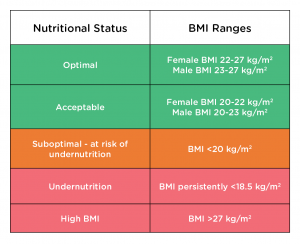Optimising nutrition and maintaining a healthy weight in people with CF, has a known positive effect on lung function.
Adequate nutrition is important to achieve:
- Reduced/less lung infections.
- Improved immunity to fight and recover quicker from infections.
- Improvements in growth.
- Maintaining lung function and exercise tolerance
- Improved wellbeing and energy for everyday activities.
- Less risk of health complications associated with CF
Individual Dietary Needs
The dietary recommendations for people with CF have changed over the years.
Current guidelines suggest that dietary advice should be individualised based on:
- Gastrointestinal and pulmonary symptoms
- Medications
- Gender
- Age
- Weight
- Height and
- Physical activity levels.
Your CF dietitian, as well as your CF care team can advise you on your specific dietary requirements. If specific questions or concerns arise regarding your nutrition, contact your CF dietitian or care team.
To keep on top of your nutritional requirements, at least once a year, you should:
- Meet with your dietitian to review your diet, supplemental vitamins and your use of enzymes.
- Create a plan together- set clear goals regarding your weight and/or diet.
- Have your blood levels of fat-soluble vitamins checked.
- Ask about having an oral glucose tolerance test (OGTT) to check for CF related diabetes (CFRD).
Body Mass Index
Body Mass Index (BMI) is a tool used to measure whether you are in a healthy weight range for your age and height. Your CF dietitian will likely measure your BMI and set goals around this. Studies have shown improved lung function at optimal BMI ranges, therefore it is important to achieve and maintain a healthy BMI.
In addition, having good nutrition and an improved BMI, can provide a buffer for in times of illness where your nutrient needs are higher or when experiencing a poor appetite. Being nutritionally well and maintaining a healthy weight, can also prevent complications such as bone loss and help you maintain a good immune system.
BMI targets for adults with CF are higher than the general population. Female adults with CF should aim for an optimal BMI of 22-27kg/m2 and for males 23-27kg/m2. If your BMI falls outside this range, speak to your dietitian regarding specific goals and strategies to achieve this.

Information from Nutrition Guidelines for Cystic Fibrosis in Australia and New Zealand (2017)